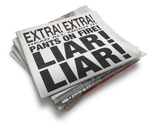

Jeff Rhodes, Electronic News Editor - Libertyville.org

Journalists don’t normally sit in meetings and plot ways to tell only one side of the story; they simply write from their own personal perspective — which tends to be almost exclusively liberal. Usually very liberal.
There are, however, exceptions to this rule as I discovered last week when I attended a two-day “Climate Change for Journalists” workshop hosted by the Seattle Times. Held at the Bullitt Center, which bills itself as the “world’s greenest building,” and conducted by the University of Rhode Island’s Metcalf Institute for Marine and Environmental Reporting, the event was precisely what we’re told never happens: a conscious, deliberate effort to coach reporters on the finer points of deceiving their readers and viewers into believing climate change is settled science.
Not that the assembled “journalists” needed a lot of arm-twisting. Reading though the bios of those who, like me, wangled invitations to the workshop, I noticed a participant who attended “on behalf of people who grow and raise our food, not all of whom accept that climate change is real.” Another proudly noted his “major area of interest is how the rhetoric and science of climate change, biodiversity loss and human health inform the creation of public policy.”
Four attendees were Seattle Times staffers, not including Kathy Best, the publication’s managing editor, who proudly introduced the event’s speakers.
I didn’t ask for a show of hands, but I’d be willing to wager I was the only climate change agnostic among the journalists present. As for the presenters…forget about it.
The first session of the day, for example, promised attendees “…a strong scientific and policy foundation for journalists covering the broad implications of climate change, just in time for the next highly anticipated report of the Intergovernmental Panel on Climate Change (IPCC).” For the record, not once in the discussion did anyone bother to point out that, in the IPCC’s previous report, it was caught redhanded falsifying its findings to look like man-made CO2 emissions were causing global warming, even though scientific evidence showed nothing of the kind.
This was followed, even more disturbingly, by a session with Hedia Adelsman, representing the Washington State Department of Ecology, who cheerily informed her audience that, “If there’s one thing we know for certain, it’s that human activities are changing the climate in ways that have committed us to centuries of change in temperature, preciptation, sea level rise and change in ocean chemistry, posing risks to our environment, econmony and way of life.”
And so it went with one speaker after another reassuring those who already agreed with them that there was only one viewpoint worth considering.
In point of fact, if there’s one thing we know for certain, it’s that nothing in science is ever certain. For every true believer the Metcalf Institute can trot out claiming the question of global warming is settled, I can counter with an equally distinguished skeptic. That isn’t to say either side is right. Clearly there are differing views on the subject and, despite what zealots in government and academia would have you believe, nothing close to a consensus exists on either side.
And as a journalist, I’m fine with presenting both sides of the issue. What I’m not fine with is obvious collusion to ignore facts that don’t comport with preconceived environmental and political biases. It's not fair to the issues and, more importantly, it's not fair to the American people.

 RSS Feed
RSS Feed
